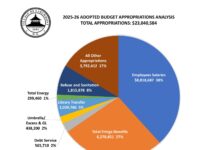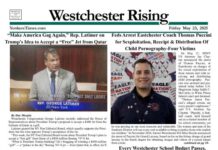
By Dan Murphy
In her State of the State address in January, Governor Kathy Hochul announced her New York Housing Comact, an ambitious plan to combat affordable housing and homelessness by building 800,000 new homes over the next decade to meet the historic shortage, and support New York renters and homeowners. The plan includes local participation requirements and incentives to achieve housing growth in every community so that every part of the State is a partner in solving this urgent crisis. The plan will also require municipalities with MTA rail stations to locally rezone for higher density residential development.
“New York faces a housing crisis that requires bold actions and an all-hands-on-deck approach,” Governor Hochul said. “Every community in New York must do their part to encourage housing growth to move our State forward and keep our economy strong.”
In Westchester, all Cities, towns and villages will be required to build 3% new homes over three years, and requires that localities with Metro-North Train stations undertake a local rezoning or higher density multifamily development within half a mile of the station unless they already meet the density level. By expanding housing potential in these transit-oriented communities, more families will be able to enjoy improved access to jobs and thriving sustainable communities.
After 3 years, in localities that do not meet growth targets, proposed housing developments that meet particular affordability criteria, but may not conform to existing zoning, may take advantage of a fast-track housing approval process if the locality denies the permit. To expedite rezoning and development of new homes, specific relief from environmental review will be included in the plan, which must be approved by the State legislature.
Governor Hochul came to Pace Law school in White Plains on Feb. 3 to highlight her housing plan, which has drawn a large amount of criticism from suburban state legislators, but support from housing advocates.
Housing Help, a non profit affordable housing group said “We at Housing Help are truly disappointed with the opposition from a handful of elected officials to Governor Hochul’s Housing Compact proposal. Legislators are elected to address and solve problems, not be a part of them. They know the housing crisis exists and their constituents repeatedly ask them to act and deliver results. Are they proposing any solutions? The time to act was yesterday. If our local elected officials denounce the Housing Compact, they need to propose alternative steps to address this urgent issue.
Westhab, stated, “We applaud Governor Kathy Hochul’s bold new plan to address NY’s housing crisis and build 800,000 homes over the next decade! We’re glad to have twice hosted the governor at Dayspring for the signing of important housing legislation and a recent Housing Roundtable. That work is clearly being continued and built upon through New York Housing Compact. Here’s to making affordable housing a top priority in building vibrant, thriving communities that work for all New Yorkers!”
What is also interesting to note is that several democratic state legislators are also raising concerns and objections to the Governor’s Housing proposal, fearing a similar uproar that happened during a similar discussion and debate between Westchester County and HUD, the U.S. Department of Housing and Urban Development, ten years ago.
State Senator Pete Harckham said, “I know from personal experience, most municipalities are incredibly wed to their authority with home rule and are very defensive of that, and I’ve already heard from some municipalities who just conceptually are in opposition. Others are saying, ‘let’s wait until we see what the actual language is.’”
One of Hochul’s arguments for the plan is that there is no place for many workers to live, or afford to live in Westchester. “They want to live in Westchester and Nassau and Suffolk in particular. There’s a lot of jobs there, and a lot of employers are saying, ‘I can’t get the workers I need.’ We have to have affordable housing to bring them out.”
Timothy Foley, CEO and Executive Vice President of the Building and Realty Institute (BRI) and member of the Welcome Home Westchester campaign, wrote an Op-Ed in support of Hochul’s plan. “Westchester County is the poster child for why we need state leadership to help us through our housing shortage. We have so many communities like Ossining, Mamaroneck, Peekskill, Mount Vernon and others that have created transit-oriented developments that are climate-friendly, millennial- and senior-friendly, and have helped revitalize their downtowns, stabilize property taxes, and boost their local economies. We’ve also seen a handful of villages and towns move forward with thoughtful proposals to allow for accessory dwelling units. But just this month, we’ve also seen Greenburgh slam the breaks on the development of moderate-to-affordable condos and co-ops by increasing property taxes on them and Pleasantville enact a moratorium on building housing not to address a specific problem with schools or parking near the train station or some other identifiable issue, but simply because the loudest voices of the community demanded it.”
“The governor’s approach offers a lot of options for municipalities to choose from, but the important point is that everyone needs to be part of the solution. ‘The way things have always been done’ is what got us into this mess. It’s time for something new.”
“The Westchester County Housing Needs Assessment found that Westchester needs to build 11,703 new units of housing just to meet present-day needs, let alone future growth. Over the previous decades, our fragmented municipality-by-municipality land use system created barriers to housing, created delays in approvals, and allowed leaders to pass the buck to others when it came to housing affordability.
Consider where this system has led us: from 2010-2018, Westchester produced just 9 homes per 1,000 residents, far fewer than comparable suburban areas around Boston (16), San Francisco (25), and Washington, D.C. (Maryland is 26; Virginia is 40).
“Despite Westchester’s reputation as a commuter community, there are nearly as many people commuting into Westchester every day as there are commuting from Westchester into New York City. We know that 30-to-45-year-olds, the key demographic that has always been the renewing lifeblood of any community, are being priced out of Westchester. In fact, it is the one demographic now shrinking the fastest as affordable housing and starter home options become increasingly out of reach. Tragically, we also know that more than 2,000 children find themselves homeless in Westchester County on any given night, according to the Department of Education.
“The Housing Compact is a bold vision to tackle our housing shortage. Many of the details should still be negotiated with the Legislature, but the overall direction is right for Westchester. Even villages and towns like Pleasantville, Port Chester, Croton-on-Hudson, and Mount Kisco are likely to easily achieve that 3 percent target with projects already in the pipeline or with reasonable reforms in existing transit-oriented development zones. The bad news is we have almost three dozen municipalities who are clinging to the “way things have always been done” — despite the clear evidence of how much harm that has done to our region and our residents,” writes Foley.
Congressman Mike Lawler called the plan a radical state takeover of local zoning. While we all understand the need for increasing the availability of housing, especially affordable housing, we cannot support a one-size fits all approach to local zoning. By forcing unit quotes onto municipalities and by providing little to no investment for critical infrastructure upgrades, you will create chaos.”
Mount Pleasant Town Supervisor Carl Fulgenzi “The governor’s proposal to force communities to add housing where she thinks it should be is a slap in the face to every local municipality in the state,” he said. “I still believe in government by the people, for the people, not something dictated or mandated by one level of government on another. And that is the direction the governor has decided to go by attempting to force her will”
Bronxville Mayor Mary Marvin writes, “The 3% requirement for Bronxville translates into 75 new housing units by the end of 2027 or we lose all control over our local land use laws. According to the Governor’s proposal, the area subject to the mandatory zoning and planning changes shall encompass all developed land within a half mile radius from a train station or in our case over 2/3 of the entire Village of Bronxville.
Closer to home our Assemblywoman, Amy Paulin is very outspoken in her opposition to this plan. As she stated, “Bronxville wouldn’t be able to accommodate so many housing units or even a fraction of the amount required. It would change the character and integrity of the community. You would no longer be a suburb of an urban area. You would be a congested urban center without the infrastructure to support it. I will fight to make sure this doesn’t happen.”
Senator Mayer shared her thoughts on the issue as well, “I have grave concerns with the approach taken by Governor Hochul in her proposed budget that seek to improve housing access in the NYC suburbs. Specifically, I believe the 3% requirement in the New Homes Target and Fast Track Approval proposal will not work in Bronxville. I also believe the Transit Oriented Development is equally flawed in the village. Both approaches apply a sledgehammer to an issue that requires a needle and thread, reflecting different communities, different needs and far greater nuance.
The Trustees and I unanimously passed a resolution in opposition to the “Housing Compact” as its passage would change Bronxville forever,” writes Marvin.
“A 3% goal in a small town would not require a large-scale gigantic development like a Co-op City to be created in their area,” said Matthew Dunbar, the executive vice president at Habitat for Humanity New York City and Westchester County.





